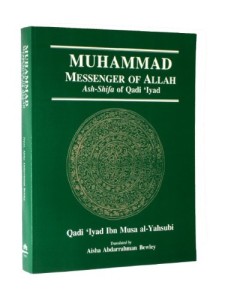But first, a special Tundra Tabloid Tribute to Andy Bostom for all the great work that he does. Much appreciated Andy, for all the mind numbing, stiff necked guff that you take. Cheers pal.
Ten Key Points on Islamic Blasphemy Law and Non-Muslims
March 13th, 2013 by Andrew Bostom |
 Qadi Iyad (d. 1149), the great Almoravid jurist, from his seminal Ash-Shifa, which includes one of the most authoritative analyses of Islamic blasphemy law’s treatment of non-Muslims: “Once Islam was firmly established and Allah had given it victory over all other religions, any such detractor that the Muslims had power over and whose affair is well-known, was put to death.”
Qadi Iyad (d. 1149), the great Almoravid jurist, from his seminal Ash-Shifa, which includes one of the most authoritative analyses of Islamic blasphemy law’s treatment of non-Muslims: “Once Islam was firmly established and Allah had given it victory over all other religions, any such detractor that the Muslims had power over and whose affair is well-known, was put to death.”
There is an intensifying global campaign to impose Islamic blasphemy law on non-Muslims, including those living outside Islamdom, in non-Muslim societies.
What follows are ten key points on the doctrinal origins and practical implications of this global campaign:
1) According to the Sunna (the traditions of Muhammad and the early Muslim community), by using foul language against the Muslim prophet Muhammad, Allah, or Islam, the non-Muslim transgressors put themselves on a war footing against Muslims, and their lives became licit (such as the poet Kaab b. al-Ashraf, who composed poems denigrating Muhammad, and was assassinated). [see 1.1, 1.2, 1.3]
2) This “offense” was then constructed and legitimated by Muslim jurists when Islam was politically, militarily and economically dominant, so that it was expected that the non-Muslims under Islamic rule would not denigrate the religion of Islam, nor cast aspersions on its major figures or institutions. [see 2.1,2.2, 2.3]
3) The jurists saw any such denigration as an unacceptable hostile act, punishable by death, automatically, as per three of the main Sunni schools of Islamic Law (Maliki, Shafii, Hanbali), and the major Shiite schools. According to the fourth major school of Sunni Islamic law, the Hanafi, the punishment of a non-Muslim guilty of blasphemy is left to the discretion of a Muslim judge. The death penalty was in fact most often applied by the Hanafis. (see 3.1, 3.2)
4) On February 19, 1989, Iranian theocrat Ayatollah Khomeini issued a fatwa condemning author Salman Rushdie to death (along with those involved in the publication of Rushdie’s book, The Satanic Verses), while promising eternal salvation to any Muslim “martyred” in this cause. As noted by Muhammad Hashim Kamali, who, since 1985, has taught Sharia and jurisprudence, as a professor of law at the International Islamic University of Malaysia, in his authoritative Freedom of Expression in Islam: “…no serious Muslim commentator has challenged the basic validity of the Ayatollah’s fatwa. Adjudication was generally viewed to be necessary if only to find out if Rushdie was willing to repent.” The fatwa wrought targeted murders in Europe and Japan, and a mass killing in Turkey.
5) This orthodox Islamic doctrine—incorporated, for example, into the “modern” Pakistani legal code (295C: “Use of derogatory remarks, etc; in respect of the Holy Prophet. Whoever by words, either spoken or written or by visible representation, or by any imputation, innuendo, or insinuation, directly or indirectly, defiles the sacred name of the Holy Prophet Mohammed (PBUH) shall be punished with death, or imprisonment for life, and shall also be liable to fine.”) has wreaked havoc, in our era, particularly among Pakistan’s small Christian minority community.
THE REST AT ANDY’S BLOG. Via Liz.

